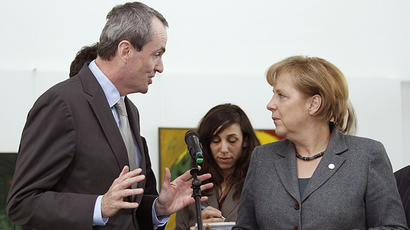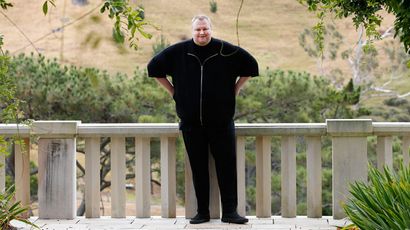Thousands fill German streets to protest Berlin’s NSA spying involvement
Thousands of demonstrators have gathered across Germany in support of Edward Snowden and Bradley Manning, as German writers published an open letter to Chancellor Merkel demanding explanations over the country’s involvement in the NSA spying program.
Protests were organized in at least 40 German cities, including
Hamburg, Munich, and Berlin, with the largest rally taking place
in Frankfurt.
Participants responded to calls for demonstrations, which were
initiated by a loose network calling itself
#stopwatchingus. Demonstrators gathered for marches
despite searing summer temperatures, some of them wearing tin
foil hats to shield themselves from the sun. Others held posters
in support of NSA intelligence leaker Edward Snowden.
#StopWatchingUs Flashmob in #germany in Support of Edward Snowden today 27.07.13 #Venezuela#Russia#deutschlandpic.twitter.com/8EobE2tsrz
— Rebbecca Robertson (@beccamebabe) July 27, 2013
The protests come just days after Snowden was awarded the Whistleblower award, established by German human rights organizations in 1999.
"1984 is now" demonstrators gather ahead of demonstrations across #germany in support of #Snowden and #Manningpic.twitter.com/NOnvvpCGmA
— Peter Oliver (@PeterGOliver_RT) July 27, 2013
“How come the BND [Germany's foreign intelligence service] and
Verfassungsschutz [German domestic intelligence] use the
NSA-program ‘XKeyScore’ for surveillance, even though there is no
legal basis for it? Is the government going to bypass the rule of
law, instead of defending it?" reads the letter published in
the Frankfurter Allgemeine Zeitung daily and signed by 48
writers.
And the letter has grown into something bigger that an outcry
from Germany’s cultural elite, as more than 5,000 people put
their signatures below the text, after it was transformed into an
online petition by one of its authors, writer Juli Zeh.
For those who doubt German citizens are ANGRY with USA and their gov, take a look at Münich via @Netz4ktivistenpic.twitter.com/9G5yARMRic
— Renata Avila (@avilarenata) July 27, 2013
The appeal to Chancellor Merkel reminds her of her own words –
“Germany is not a surveillance state” – which she uttered
at the July 20 press conference. The writers go on to say that
wasn’t true.
“We witness a historic attack on our constitutional democracy,
the reversal from presumption of innocence to general
suspicion,” says the letter, demanding answers from Angela
Merkel, who said she never knew anything about PRISM until the
media leaked Snowden’s revelations.
That stance has however been shattered by Der Spiegel magazine, which exposed that German secret services had a role to play in the NSA spying process.
While Merkel has been cautious in commenting on the issue, even justifying the NSA methods Germany’s President Joachim Gauck spoke out in defense of Snowden.
"This will normally only be put right if information is made public. Whoever draws the public's attention to it and acts out of conscience deserves respect," he told Passauer Neue Presse newspaper, as cited by Reuters.
Although the German president does not possess political power –
that rests in the hands of the chancellor - Gauck’s voice matters
as he is a highly popular and respected politician with a record
in defending civil rights.
An East German dissident during the time when the country was
divided, Gauck worked on exposing Stasi, the secret police, which
conducted massive surveillance.
"The fear that our telephones or mails are recorded and stored
by foreign intelligence services is a constraint on the feeling
of freedom and then the danger grows that freedom itself is
damaged," Gauck said, referring to the NSA program.
The government feels it has to somehow respond to the avalanche
of criticism over its role in helping the US-led spying. Two of
Germany’s most senior cabinet members have come up with the
initiative to push the UN to change their current privacy
legislation, which has remained intact since 1966, when there was
nothing like mobile phones or the internet.

The initiative is seen by many as an attempt to reduce the damage
done by Snowden’s revelation to the reputation of the German
government ahead of September election. Whatever the politicians
motives are, though, they appear to be moving in the right
direction, according to the Berlin Commissioner for Data
Protection and Freedom of Information, Dr. Alexander Dix.
“Data Protection Commissioners all over the world have for
long time called for an international treaty to have privacy
regulations in place to protect individual privacy and data when
surfing the internet and crossing borders. And now the NSA
scandal is just the last tip to make it completely clear that we
need an international agreement in this sphere. What we are
seeing here is really excessive secrecy protecting excessive
surveillance and that cannot go on as it has done in the past. We
need effective control and we need limits to what the
intelligence services are allowed to do,” he told RT.














